- From Faith Current: “The Sacred Ordinary: St. Peter’s Church Hall” - May 1, 2023
- A brief (?) hiatus - April 22, 2023
- Something Happened - March 6, 2023
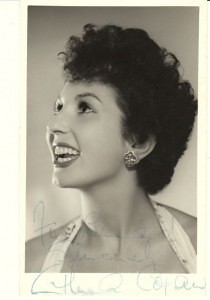
Mrs. Brian Epstein? (or Mrs. Lionel Bart? or Mrs. John Lennon?)
MIKE GERBER • Happy to report that The Fifth Beatle, Vivek J. Tiwary’s graphic novel about Brian Epstein, continues to carve out a bit of space in the culture. Here is an interesting interview with Tiwary. Apparently Tiwary’s a strong supporter of marriage equality, and the book is affiliated with Freedom to Marry; in the course of discussing marriage equality, Tiwary says the following:
There’s a line in the book, during a television interview where Brian’s being asked about the Beatles’ romantic lives, and Brian said “I think Beatles ought never to be married, but they will be one day and someday I might too.” It was viewed as a throwaway joke at the time, but really it was a pretty heavy thing that he said – people who knew him well realized he was saying something quite dangerous for that time. Because forget about getting married, he was worried about staying out of jail, should his sexuality be discovered – that’s the way things were in 1960s England. If there had been marriage equality in the 1960s, it would clearly have made a huge difference in Brian’s life, it might have even saved his life.
Tiwary’s larger, and much more important, point is valid: there’s no question that much of Brian Epstein’s self-destructive behavior came from living in a time and place where his sexuality was considered criminal, and that living in a gay-is-normal world, with the option to marry, have children, et cetera might have discouraged his drug-taking, self-abusing, risk-craving behavior. Or maybe it wouldn’t have, we can’t know–but it’s a legitimate point and one that truly does argue for absolute equality and respect in matters of sexual orientation.
But I don’t think Brian was talking about marrying another man–for two reasons. The first is Alma Cogan, whom Brian had a very close friendship with from 1963 on. (Some in the Beatles circle expected she and Brian to marry, especially after he took Alma home to Liverpool to meet his parents.) Cogan died tragically young of cancer in October 1966, and her death surely helped cause Brian’s downward spiral in late 1966–the first real scare with Brian, if I remember correctly. Alma’s death plus the end of touring shaking Brian to the core makes a lot of sense.
Given who Brian was, where he came from, and what he seemed to crave, it could be that marriage to Alma–consummated or not–felt like his last chance to win the full approval of his family, especially his mother. Alma wasn’t only Jewish, she was also a product of pre-Beatles Britain; she was a pop star his parents would understand. On the other hand, Alma herself was dogged by rumors of lesbianism (though no less an authority than Dusty Springfield says ’tweren’t so), and was also squired about by Lionel Bart. And–supposedly–had an adulterous affair with John Lennon. So all this is quite complicated–but I get the feeling that Alma wasn’t simply a beard, because Brian himself was anything but simple.
The second reason is that gay marriage is very much a current issue, and while it might be politically useful and psychologically appealing for us to think that Brian Epstein longed to marry, none of what we know about his behavior suggests that he was just waiting for the right guy to settle down with. There were notable gay couples of the era that I could easily see wanting to marry each other–Christopher Isherwood and Don Bachardy, for example–but Brian didn’t seem to have steady boyfriends, much less stable, committed partnerships. Epstein’s sex life wasn’t just furtive and serial, it also seems to have been somewhat impersonal, and to some greater or lesser degree part of the upper-class BDSM subculture of Swinging London. To suggest that he’d have married if only society had let him seems…convenient. Well-intentioned, a nice marketing hook for the book, but not really backed up by what we know.
Just as we diminish John Lennon when we turn him into Gandhi to give ourselves courage to do what we know is right, we risk missing something very important about Brian Epstein if we turn him into a martyr for marriage equality, a gentle gay butterfly broken on the wheel. Just as it was Lennon’s violent, impulsive nature that spurred him towards more peaceful politics, I suspect that Epstein’s darker, more transgressive cravings caused him to long for respectability–as Queenie and Harry would’ve defined it, not how we define it today.

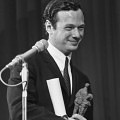

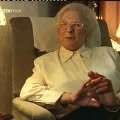
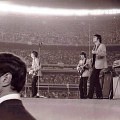
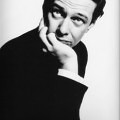
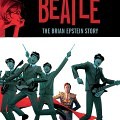
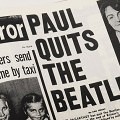
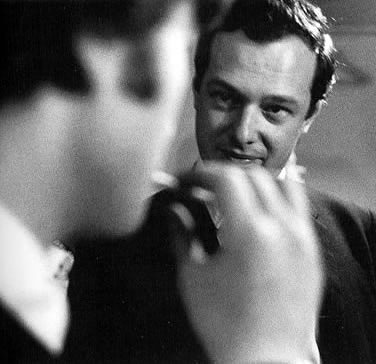
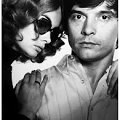

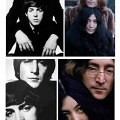
I agree with you that Alma wasn’t “simply a beard,” not just because Brian was complicated, as you say, but also because I think very few of the gay-leaning men who married women and had families in that era would have thought of their wives as “beards,” even if their preference for men was acknowledged and consummated in an ongoing way. I also doubt that the women who were knowingly in these arrangements thought of themselves as simply beards. Sexuality and family is more complicated than that – for everyone, not just Brian. (There was the occasional arrangement by a Hollywood studio looking to avoid gossip about their leading man, where the marriage was truly a “sham,” but I think those were the exception more than the rule.)
Stew, I don’t know enough about the theory and practice of bearding to speak to your last point, but I think it’s wise to assume complexity and a Kinseyian distribution for all parties. That having been said, given the people involved, I actually don’t think it’s unreasonable to dismiss Brian’s relationship with Alma as some species of beard–they were both in showbiz, and both rumored to be gay in a time when the merest whisper of that would’ve been professionally catastrophic. The more interesting question–and the key to my Beatle Noir sequel, if I ever write it–is why didn’t the legendarily fierce UK tabloids out Brian Epstein? The short answer is that he was connected to some heavy, heavy muscle.
Getting back to beards: I don’t think Brian was constitutionally able to live that kind of life any more than, say, Joe Orton was. In fact, Brian seemed determined to push things closer and closer to exposure; that was obviously part of the thrill for him. There was simply no need for someone in Brian Epstein’s situation to be putting himself at risk with cheap hustlers. He was seeking out situations like that–seeking out stuff like Dizz–for whatever reason. So to suggest that he would then reverse behavior and arrange Alma as a beard…Doesn’t seem likely. Possible, of course, but unlikely.
Even in Britain, even then, there were homosexual men who cobbled together stable partnerships. And if you had Brian’s kind of money and usefulness, gay men in Britain had prospered since…forever. The idea that one has to publicly announce one’s preference to be happy is a post-Stonewall idea, and nobody has ever suggested that Brian felt that way. Nobody can really know, but Brian Epstein’s angst seems to have been about much more than just his sexual orientation, and certainly more than his inability to tie the knot with some nice Jewish gentleman.
Yes, an Alma and Brian partnership certainly SOUNDS beard-y, I’ll grant you, and John Lennon’s reported reaction to the idea was straight-up derision. But Norman also reported that Brian was really taken with Alma, and I wouldn’t underestimate the power of wishful thinking combined with affectionate admiration in Brian’s intentions here. I can’t see it as 100% calculated deception. And as you point out, “settling down” with a nice guy did not seem to be a possible future for Brian, so this could have been his only chance at a stable home life of some sort.
I sincerely hope you write your Beatle Noir sequel, complete with heavy muscle connections for Brian, BUT, did the UK press really out any men in that era? The US press, as a rule, didn’t. It just wasn’t done, as it opened the writers up to libel cases on one side, and complaints that children have now been exposed to naughty concepts on the other side. The same went for other types of scandals as well, as I understand it. In fact, this was one of Paul’s arguments in the LSD scandal – “You guys aren’t supposed to print this stuff – if the children are corrupted it’s your fault, not mine.”
But overall, yes, Tiwary’s assertion that marriage equality would have saved Brian seems ludicrous to me, too. Also his severe misreading of the quote he discusses. I also personally could not enjoy, or even read past the beginning of, his book after asking for and receiving it for Christmas. I felt, in the first few pages, that Brian was being reduced, once again, to his sexuality, and that his risky behavior was also just being chalked up to that same sexuality. Exactly the conflations you point out here are what turned me off of the book itself.
@Stew, I’m no scholar of the UK press, I’m only parroting their reputation. Anybody out there know more?
Methinks the Lennon doth protest too much, as he was also paying court to Alma in a slightly sweatier fashion.
Brian strikes me as the kind of person who could compartmentalize love and sex; and thus be able to love Alma–geniunely, perhaps somewhat immaturely in that Ruskin-flummoxed-by-female-pubic-hair kind of way–while still “cottaging” his brains out. And it’s quite important to me that people reading this post and thread don’t hear any “tsk-tsking” in what I say, because I don’t have an opinion. I truly don’t know what would’ve been best for Brian, or what he could’ve done, much less should’ve done. Brian’s sexuality was Brian’s sexuality, practiced among consenting adults, and while his preference for rough trade predisposed him towards self-destructive behavior, the guy could’ve been as straight as an arrow and died exactly the same way. Brian’s problem was addiction, not sexuality.
I too find Tiwary’s reading of Brian’s situation simplistic and wishful. While I endorse what I understand him to be trying to promote (marriage equality), I don’t think it’s right to dragoon Brian Epstein into serving that purpose. The degree to which marriage between two men or women is thinkable by most people, in a strictly literal sense, has changed radically in the past few decades. Suggesting that Epstein’s comment about his possibly getting married someday was an endorsement of gay marriage is projecting our time onto his, which I think is a mistake. For one thing, this kind of projection onto the past downplays the degree to which prejudice deeply informed what most people could think and imagine doing at the time. And it ignores the realities of Epstein’s life as we know them, as you point out, Michael.
I also wonder if Epstein might have felt a spark, however small, of physical attraction to Alma Cogan. Sexual orientation is not necessarily 100% gay or straight, after all. Even if he didn’t, he might well have felt a strong pull for a stable household with a friend he felt understood him and knew his secrets.
One last thought: if Epstein HAD been able to organize his sexual life along more endurable lines, it would have been vastly better for him — but it might have been worse for the Beatles. They were the center of his emotional life, and they benefited from that in all kinds of ways. Now that’s a story I’d be interested in reading.
Here’s an interesting trio of sexual orientation charts/grids/scales, to remind us how fluid this all is.
Sexual identity is complex, fluid, multifactorial; individual sex acts are opportunistic, products of a time and place and person. This is why I think What Happened in Spain between John and Brian, whatever it was, is merely interesting, not determinative; we already know John and Brian loved each other, and we already know that one identified as straight and the other as gay. “Sex,” in the words of James Thurber, “is an incident.” To which I’d add, “and not necessarily anything more than that.” Anybody who at this late date doesn’t think that one or more Beatles had a same-sex encounter–if even by mistake!–isn’t really thinking about what their sex lives must have been like. No “whoops, she’s a guy” moments? Rather unlikely, I think.
Were Brian Epstein alive today, I’d be shocked if he weren’t for absolute equality for homosexuals, given his own sufferings. But past that, it gets very dicey; one need only go so far as Quentin Crisp’s views on gayness, and gay liberation. And because we can’t know what Brian would’ve thought, I think we have to shy away from being as definitive as Tiwary, even if we’re on the same side of the issue as he is.
For those interested in the topic, here’s Quentin Crisp being interviewed by Bernard Braden in 1968. “When there is no opprobrium heaped on homosexuals from the outside, they will cease to have to confirm or deny.” Suggesting that Brian would’ve wanted a conventional monogamous marriage with a gay man seems too intertwined with our current view of “normal” sexual mores–our assumption that pair-bonding is the best of all possible arrangements, our modern mania to force rigid taxonomies on sex–to be truly freeing, or truly respectful of the human diversity of which Brian was a part.
Some future historian/graphic artist is going to write/draw a hell of a graphic novel called “The Real Fifth Beatle: The Sir George Martin Story”. Wish/hope I will be around to read it!
Me too, as long as “The Real Fifth Beatle”, like The Book of Mark, mentions how George Martin didn’t really want to sign those Beatles at all but was pressured into it by a company displeased about that affair he had with his secretary WHILE ALREADY MARRIED TO SOMEBODY ELSE OMG WTF.
I have been guilty in the past of simplistic thinking concerning Brian, believing that if only his times were different, he could have settled down and married (like Sir Elton) and even adopted a child with Lady Gaga as godmother. But of course his reality was somewhat more complicated. Brian was drawn like a moth to flame to rough trade hustlers like Diz, and I doubt any marriage would have dampened those desires.
But maybe he would have been a happier person if Alma had lived long enough to convince his beloved mom she’d made an “honest man” of him. And no matter who he’d be chasing after hours, he could have breakfast every morning with a charming, talented lady. And maybe someone like Diz would have had less power over him.
But life never turns out the way it should. Ugly things like cancer and addiction and cruelty always seem to get in the way.
True, but I would like to add that even though we live in ostensibly more liberal/tolerant/accepting times already, the REAL breakthrough will only come when it is no longer mandatory for We Homosexualists to be associated with that terrible Gaga woman. Sorry, I’m sure you didn’t mean it that way. 🙂
@Nancy Carr – Sorry, the blog won’t let me reply directly to your comment above – One interesting factoid about gay marriage: “Homosexual marriage” was actually being openly discussed and considered around the time that the Sexual Offences Act was being discussed. (It became law in ’67.). The Act, of course, did not include homosexual marriage as enacted, but many saw it as a logical component of decriminalizing homosexuality. You can even hear both Lennon and McCartney refer to the homosexual marriage debate in separate, contemporaneous interviews. (They’re both pro, obvs.)
But, as I said above, no way was BRIAN talking about a homosexual marriage for himself in an interview, for heaven’s sake! I disagree with you that he couldn’t have imagined that. He probably could, but I’m pretty sure it couldn’t have happened for him, and maybe he was sure, too.
Anybody who at this late date doesn’t think that one or more Beatles had a same-sex encounter–if even by mistake!–isn’t really thinking about what their sex lives must have been like. No “whoops, she’s a guy” moments? Rather unlikely, I think.
Allan Williams, in his book “The Man Who Gave The Beatles Away” claims that several transgender entertainers assured him they’d enjoyed Thurberesque incidents with the early Beatles.
@Sam, I love it when you bring in Classic American Humorists, really I do. 🙂
NO WONDER John drew in that manner!
I take Brian’s statement to mean two things: a wish for a love-filled life, and an attempt to establish his (faux) heterosexual creds in the press. Probably more the latter than the former.